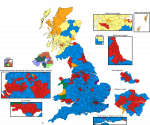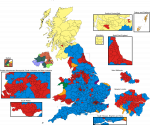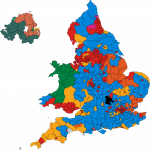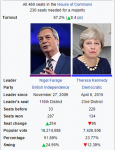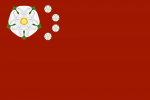Danubian Federation Party Run-Down (01/11/2018)
Alright! You can stop pestering me, @HerzogTruthteller!
Here's that party run-down you asked your humble token Danubian to make for you, based on the vibes from the election last month! Fair warning, I'm a member of the Vienna metropolitan elite, and I only speak Hungarian and German alongside my native Yiddish, so my takes on some of the national autonomies are will be biased by my federalist-tinted lenses!! For the monarchaboos, the current Kaiser is Karl Thomas I; this will be His Imperial and Royal Majesty's fifth government! Anyway, without further ado, here's the state of Danubian politics right now!
Government
Christian Union: The union comprises the sort-of-national Christian Social Party and the strictly-Hungarian Catholic People's Party, and is the main force of the political right. It is holding strong, well, as strong as it ever holds; name a more iconic duo than the KNPM and threatening to rupture the CU. Fiala is holding it together, mostly by pork barrelling the hell out of Hungary. So, nothing new there.
Christian Social Party: Defined by Political Catholicism and Danubian unionism, the Christian Social Party is the main centre-right force outside of Hungary. It heads the government, with their leader Petr Fiala installed as Minister-President. The Christian Union bloc along with the KNPM is the largest political group in the House of Deputies, but CS are not the largest party. In spite of this, Fiala has managed to put together a majority by calling on the radicals and the agrarians. He's been trying really hard to push his national curriculum idea, but, well, he's failing like every centraliser has before him. It does really help you realise how far the CS have come, though; the antisemitic founders would be horrified to learn that it is now led by not just a Moravian, but a Moravian of Jewish heritage!
Catholic People's Party in Hungary: The other half of the Union, which runs exclusively in Hungary. It is politically Catholic and conservative - more so than the CS - and has wings which range from softly unionist to autonomist to softly pro-independence. Zsolt Semjén has been made Deputy Minister-President, Minister of the Economy and Minister for the Autonomies, building up quite the fiefdom for himself. He's signed off on the national curriculum on the basis that the Hungarian Autonomy gets an opt-out. As soon as he supported the motion, there was an announcement that his constituency would be getting a new hospital, too. How curious.
Radical Constitutionalists: Your generic liberals. They're broadly unionist - but also have a strong autonomist streak - and are in a perpetual state of struggle between classical liberals who tend to support the Union, and social liberals who tend to support The Other One. Beate Meinl-Reisinger was elected to lead as a social liberal, so she surprised her party by signing up to Fiala's coalition. Her price was Minister of Finance. She seems to be the only other coalition leader to be fully behind the curriculum reform, but the party is much more split.
Agrarian Peasants' Party: They should really rebrand as the Romanian Autonomist Party, as that's the niche they fill in national politics. Officially, they're agrarian and unionist. Mihail Neamțu has led them pretty much since he graduated from the University of Vienna. He made sure his party got the agriculture and environment briefs. He's literally admitted to only signing on to the curriculum in exchange for more investment in Transylvania.
Opposition
Social Democratic Workers' Party: My boy! Look how they massacred my boy! I kid, but the SD really have seen better days. They're still the predominant force of the centre-left, but for how much longer is anyone's guess. These guys still officially claim to be Austromarxists, you know. Nowadays that mostly means they're milquetoast social democrats who won't shut up about how they instituted the national personal autonomy system. They're also pretty authentically unionist for the same reason. They came out of the election with the most seats, but on their lowest voteshare in history; it feels like Michael Ludwig is presiding over a dying party. Bring back Otto Bauer!!! I don't know where the SD stand on the national curriculum, and frankly I'm not sure they do either.
Party of Independence and '48: This is the biggest openly separatist party in the federation, and the only one with federal representation. It is, of course, Hungarian. It tends to be the only opposition to the KNPM in the Hungarian regions, though, so it gets quite a few soft unionist votes as well. It's a very big tent; Hungarian nationalism is the main unifying force. Gábor Vona is the leader, and he's not actually in the House of Deputies; he was recently elected simultaneously as Chair of the Hungarian Autonomy and State-President of the Great Plain Region. They are fiercely opposed to the national curriculum reform, and see this as the first step to destroying Hungarian culture, alongside allowing people to speak Croatian.
The Greens/Civic Union: Alright guys, please don't hornypost about Čaputová. Especially not since her co-leader, Peter Pilz, is probably going to be pushed out for being a creep. Part of me thinks he might have been replaced by the Kaiser's dad, were he still alive and not a royal. The Greens are, well, greens. Y'know; pro-renewables, anti-coal, pro-peace, anti-war. They officially merged with the more progressive Civic Union way back when, but it's just a progressive green party for all intents and purposes. They're not really on board with the national curriculum.
National Association: So do you guys remember Herr Hitler? That officer who got himself dishonourably discharged for trying to overthrow Kaiser Karl Franz way back in the 1930s? The
Nationalverband is the descendent to his little movement. It's antisemitic, anti-Magyar, anti-Slav, anti-Roma, anti-federalist and pretty much anti-everything-you-like. It sells itself as being the autonomist party for German-speakers, but it's blatantly just a racist outfit. Thankfully, it's remained on the sidelines despite Heinz-Christian Strache's oratory skill. He's come out in favour of a national curriculum in principle; he's opposed to Fiala's due to it's "Moravian influence". Yikes.
Independent Socialist Workers' Party: USAP traces itself back to a split from the SD back when the distinctions between Orthodox Marxism and Austromarxism actually mattered. Now, it's just a vaguely left-wing democratic socialist party, which every now and then reminds the world about the anti-Marxist purges of the 20s and 30s, particularly those in Russia. Has a reputation for being more of a social club for union barons and college students than a real party; so, you know, it's a left-wing party in Europe. Vojtěch Filip has led it for a while now, and he's basically the "politician you can get a pint with" archetype. He doesn't like the national curriculum, but like Strache this is because he thinks Fiala will do it wrong.



